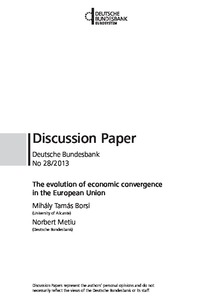The evolution of economic convergence in the European Union
"This paper investigates economic convergence in real income per capita between 27 European Union countries. We employ a non-linear latent factor framework to study transitional behavior among economies between 1970 and 2010. Our results offer important insights on the economic catch-up exhibit...
| Main Authors: | , |
|---|---|
| Institution: | ETUI-European Trade Union Institute |
| Format: | TEXT |
| Language: | English |
| Published: |
Frankfurt am Main
2013
Deutsche Bundesbank |
| Subjects: | |
| Online Access: | https://www.labourline.org/KENTIKA-19124545124919427279-The-evolution-of-economic-conv.htm |
| Summary: | "This paper investigates economic convergence in real income per capita between 27 European Union countries. We employ a non-linear latent factor framework to study transitional behavior among economies between 1970 and 2010. Our results offer important insights on the economic catch-up exhibited by the new EU members in light of the institutional changes and macroeconomic adjustment processes undertaken over the last 40 years. Our main findings suggest no overall real income per capita convergence in the EU, however, we identify subgroups that converge to different steady states using an iterative testing procedure. Regional linkages play a significant role in determining the formation of convergence clubs. The empirical evidence suggests a clear separation between the new and old EU member states in the long run. " |
|---|---|
| Physical Description: | 24 p. Digital |

